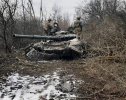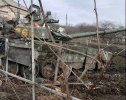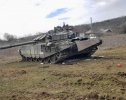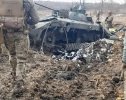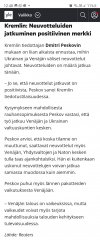Vastaavalla logiikalla NATO:n puolustajien mukaan Venäjä hyökkää heti valtavalla voimalla tai ydinaseilla, jos Suomi jatkaa liittoutumattomana.NATO:n vastustajien mukaan uskotaan siihen, että Venäjä hyökkää heti valtavalla voimalla tai ydinaseilla, kun Suomesta tulee jäsen.
Ei sillä ole väliä, mikä on todellinen tilanne.
Install the app
How to install the app on iOS
Follow along with the video below to see how to install our site as a web app on your home screen.
Note: This feature may not be available in some browsers.
You are using an out of date browser. It may not display this or other websites correctly.
You should upgrade or use an alternative browser.
You should upgrade or use an alternative browser.
Ukrainan konflikti/sota
rty19
Greatest Leader
Oletko ihan varma että meni kohde oikein...?Jassoo, Rob Lee samoilla apajilla silmä(kin) kovana:
mitä tarkoitat?Oletko ihan varma että meni kohde oikein...?
lsoviha
Eversti
Tämä on sitä informaatiovaikuttamista parhaimmillaan. Ensin jaetaan tavaraa nostamaan sitä uskottavuutta ja lopulta lyödään ”jytky” pöytään.
Tässä kirje kokonaisuudessan:
Putin expects the West to blink in the face of his threats - 6th letter from the Wind of Change inside the FSB
My translation of the 6th #FSBletters in the series from #WindofChange inside the FSB to Vladimir Osechkin. Written March 13th. Highly time-sensitive information of what to expect from Putin in the coming days.“It appears World War III has begun; our guys are opening champagne - the war between Iran and the United States disrupts the nuclear deal and blocks the ability to replace Russian oil with Iranian oil. The inevitable shutdown of the Strait of Hormuz will cause oil to skyrocket in price. I have no idea why Iran chose to shoot itself in the foot. I’m could even believe in the existence of some kind of generally incomprehensible agreements (between Russia & Iran), but I don’t have a single fact that supports this.
Today I just want to convey information about the impending "exit" for Russia through our eyes (FSB as an organization, not #WindofChange individually) and the "courtiers" at the Kremlin. (Reference to a royal court under a King)
This is not a “copy,” (of the actual brief) but an extremely accurate retelling, so you can do with this as you wish, including full publication without any redactions.
Currently there is only an outline, and a final report will be much more voluminous, detailed, and more concrete as the work has only just begun. Afterward I will try to provide my own input (on this new plan) as I am currently pre-occupied with the situation of the Iranian-American conflict. The “Gordian Knot” will definitely be seriously revised/adapted (because of Iran launching a missile at the US base in Iraq).
Operation “Gordian Knot”
1st Stage: Most likely, Konashenkov (Major General, chief spokesman for the Russian Ministry of Defence) will officially declare at a briefing that Europe and the “collective West” have declared war on Russia by intervening in the Ukrainian conflict with their weapons and mercenaries, while simultaneously attacking Russia in the economic plane (sanctions). There will be an extended lecture that war is not contained to military operations on the battlefield, but it includes an array of aggressive actions aimed at causing direct damage to the opponent. That the West’s action de-facto unleashed a world war. That this war has not yet moved into the “hot stage” with missiles and tanks only because Putin, as the supreme commander in chief, did not give such an order. Nevertheless, Konashenkov will declare that the third world war has begun.
2nd Stage: Assessment of the reaction (by the West) – 1-2 days.
3rd Stage: Putin will make a speech. In this long lecture he will declare that the modern world is not as it was before, that war now includes cyber attacks, preparation of biological attacks, direct attacks, training of terrorist & saboteurs, and imposing of sanctions devastating to the economy. He [allegedly] does not want war, but the West has already started it (against Russia). As a result, (Russian) response need not be symmetrical and can respond to any act of aggression with any means available in a military confrontation. “I warned with Ukraine – but nobody listened” (Putin’s message). Russia has shown that its words (threats) are not empty. Putin will declare that he is ready to come to terms (forgive) with what the West has already done, but only if sanctions are lifted within 24 hours, all assistance to Ukraine is stopped, and that NATO will guarantee not to expand. (Still Putin’s upcoming speech) Otherwise, Russia will have no choice but to accept the war and respond with all available means.
4th Stage: A fierce negotiation process (between Russia and the West) – in the initial hours Putin will be conspicuously unavailable for communication (with the West). Other countries’ presidents will be obliged to discuss issues with Putin’s aides – “or not at all.”
Putin's demonstrative private phone calls will begin with the leaders of countries that Russia is betting on: Serbia, Hungary, China, the Arab world, African countries and Asian countries.
Assessing the situation of the West’s readiness to respond to the challenge, agents of political influence will be activated. They will call to “immediately fulfill Russia’s just demands, and not drag the world into a new war” - here the task is to quickly propagate the message that “the war was unleashed by the West, but Russia cannot not to answer.”
Stage 5: Based on the assessment of the situation over the following 24 hours, the following options are possible:
- 1. West blinks and is prepared to make local concessions. In this instance the following position will be voiced: “we have been heard, there are positive signals and we consider this a factor that allows us to delay making a final decision." (Whether to start military operations against the West) Putin will set aside several days for the negotiation process, after which he will “make a decision.” In this scenario the West is given time to go through stages from denial to acceptance – practically all that will remain is to extract maximal concessions (from the West), which will turn out to be the most significant. The maximal objective is to sign a new international treaty of a global nature (total appeasement of Russia)
- 2. The West does not comply, but openly does not want war. In this instance “military targets” will be demonstrably identified: Poland and the Baltic countries. Moreover, identification of “limited targets” in these countries is possible, with a public appeal to civilians not to be near these objects. Immediately after this, a super-intensive format of negotiations will start, with a key goal of forcing the West to reject all support for Ukraine and a possible “compelling of Ukraine to peace” by the West. Strategic aviation and nuclear triad will be activated, and a No Fly Zone may be declared over these countries (by Russia). Chances of success (for desired concessions from the West) are considered to be highly realistic (if it gets to this point). Otherwise, localized missile strikes (against Poland and Baltics) will be almost inevitable.
- 3. The West does not comply and demonstrates readiness for war in response. This scenario is considered to be extremely unlikely. In this instance cyber attacks will be launched on key infrastructure facilities of Western countries. Russia will not take direct responsibility, while actively "moving" its forces of the (nuclear) triad. With this development of events, the risks of the West using military methods to respond are assessed as negligible, which gives Russia room to maneuver to conduct an indirect war to create unacceptable conditions for the West with the risk of total economic collapse. After this, negotiations are considered inevitable and will result in the scenario #2 above. And –
- 4. In the case of an absence of clear coordinated signals (from the West), which is assessed as unlikely but acceptable, the (Russian) behavior will be similar to scenario #2 above (as well).
- 5. A fundamental collapse of the West within the time allotted (by Putin) after the ultimatum was issued. Rejection of “collective security”: Withdrawal of several countries from NATO (and possibly European Union), each with separate appeals to Russia that they are not conducting aggressive actions against Russia and they are not part of the possible war. Then everything will default back to scenario #1 above, but Russia’s strength in position (for negotiations) will be comparable to that of the USSR. In the future, this will allow Russia to take political control of a number of countries that were part of the USSR. NATO as an integral structure will cease to exist.
- 6. A fundamental collapse of the West, but with a clear separation of a number of countries [Poland and the Baltics] from the moderate position of other countries. (Here, #WindofChange means a scenario in which NATO tries to appease Russia but Poland and the Baltics refuse to stand down to Russia) In this case the “pro-Russian wing” of the Western countries will accuse these countries (Poland/Baltics) of fomenting conflict along with a demand “not to drag our governments into someone else’s conflict.” Russia's objective in this scenario is to apply maximum pressure on Western countries with a moderate position, demanding that they “keep the aggressors (Poland/Baltics) from reckless actions." In this situation, within a period of 3 to 7 days, Western countries with a moderate position will be ready to accept local strikes against countries with radically irreconcilable countries (Poland/Baltics), after which missile strikes [on military targets] will be launched on them (Poland/Baltics). Direct infantry invasion is considered acceptable but unlikely.
- Arab countries, Iran, China, some African countries, and [presumably] India and Brazil will take neutrality with a general condemnation of "mutual aggression";
- Some European countries are guaranteed not to support military confrontation: Italy, Hungary, Serbia, possibly France;
- Powerful movements will be activated inside Western countries aimed to both support Russia and recognize it as a “defending side.” A number of anti-war movements not necessarily in support of Russia but which will create an impossible environment for their governments to make a pro-war decision;
- Global nuclear war will not happen;
- The Ukraine question will be resolved with finality – by the West.
Ja kysyyhän ne kun eivät itse osaa. Keskustan puoluekokouksen ohjelmaan taitaa kuulua spiritismi-istunto jossa Urkkikin saa sanoa mielipiteensä.Saatanan tunarit, kysyisivät Kekkoselta! Vaikeneminen on myöntyväisyyden merkki.
Viimeksi muokattu:
Jokin tässä haisee maskiroskalle. Me tiedämme että he ovat täysin korruptoineet ja tämä on se tulos?Tässä kirje kokonaisuudessan:
Toki joitakin varsinkin uudempia veturityyppejä on mitkä ovat kokonaan tai osittain ulkomaista valmistetta. Mutta esimerkiksi mainitut 675+221+221 Siemens-taustaista veturia ovat lukumäärältään vain noin 5% Venäjän koko veturikannasta.Ekassa linkissä typo, tässä se oikein:
https://www.railway-technology.com/...s-jv-supply-675-locomotives-russian-railways/
Tekstimuodossa siis osoite oikein jo alunperin.. Linkin mukaan Simens valmistaa vetureita Sianaran kanssa joka siis Venäläinen yhtiö. Jutussa puhutaan ensimmäisistä veturieristä käsittäen matkustajajuni ja tavarajunia. Erät 675+221+221 veturia. Tuo siis 2010-2016. Veturitehdas omistukset Siemens 49% ja Sianara 51%. Siemens tuollain pistänyt rahaa 100miljoona veturituotannon käynnistämiseen Venäjällä.
Kyllä tuo nyt ihan oikeasti haisee sille että ne "Venäläiset" veturit on oikeasti Saksalaisia..
Venäjällä (tai Ukrainassa) kun veturivetoisia junia katsoo, niin melkein aina siellä keulilla on neuvostoaikaista suunnittelua edustava massiivinen ilmestys missä koolla ja raudan paksuudella on kompensoitu teknisten hienouksien puute. Dieselveturit sylkevät jylinän kera ison mustan savupilven ilmoille.

Tuosta uusimmasta "FSB-kirjeestä"
Vähän kyllä kuulostaa oudolta, että Putin alkaisi ohjuksilla moukaroimaan Puolaa ja Baltiaa koska NATO kyllä heilahtaa puolustuskannalle suoraan, jos jäsenmaita vastaan hyökätään. Olkoonkin vaikka olisi varoitettu siviilejä olemasta sotilastukikohtien lähellä niin itse en näe tässä skenaariossa mitään järkeä.
Vähän kyllä kuulostaa oudolta, että Putin alkaisi ohjuksilla moukaroimaan Puolaa ja Baltiaa koska NATO kyllä heilahtaa puolustuskannalle suoraan, jos jäsenmaita vastaan hyökätään. Olkoonkin vaikka olisi varoitettu siviilejä olemasta sotilastukikohtien lähellä niin itse en näe tässä skenaariossa mitään järkeä.
Meillä Suomessakin nuo Siperian sudet kestävät raudaltaan vielä ihan hyvin. VR on viime vuosina päivittänyt niihin 70-luvulla tehtyä Strömbergin elektroniikkaa nykypäiväiseksi. Oli ne vanhat kortit nostalgista katsottavaa...Toki joitakin varsinkin uudempia veturityyppejä on mitkä ovat kokonaan tai osittain ulkomaista valmistetta. Mutta esimerkiksi mainitut 675+221+221 Siemens-taustaista veturia ovat lukumäärältään vain noin 5% Venäjän koko veturikannasta.
Venäjällä (tai Ukrainassa) kun veturivetoisia junia katsoo, niin melkein aina siellä keulilla on neuvostoaikaista suunnittelua edustava massiivinen ilmestys missä koolla ja raudan paksuudella on kompensoitu teknisten hienouksien puute. Dieselveturit sylkevät jylinän kera ison mustan savupilven ilmoille.
Tuosta uusimmasta "FSB-kirjeestä"
Vähän kyllä kuulostaa oudolta, että Putin alkaisi ohjuksilla moukaroimaan Puolaa ja Baltiaa koska NATO kyllä heilahtaa puolustuskannalle suoraan, jos jäsenmaita vastaan hyökätään. Olkoonkin vaikka olisi varoitettu siviilejä olemasta sotilastukikohtien lähellä niin itse en näe tässä skenaariossa mitään järkeä.
Tässä eräs huippusalainen vuoto:
5. artikla laukeaa tahallisesta iskusta Naton maaperälle. 2000 Nato-maiden hävittäjäpommittajaa Venäjän ilmatilassa saattaa saada jotain tuhoa aikaan. Pieniä 10-20 vuoden myöhästymisiä esim. Venäjän sisäisessä juna- ja lentoliikenteessä odotettavissa.
Tarkoittaa sitä, että tuo video on esitetty myös iskuna Azovin miehittämään rakennukseen ja kalustoon. Joskin ajoneuvoja oli vähemmän silloin.mitä tarkoitat?
Noista kuvassa olevista ajoneuvoista yhdessä on nähdäkseni Z-merkintä. Yleensä ruskien toosissa on niitä merkkejä joka puolella. Joko Z, V, O tai ainakin jotain viivaa. Myös katoissa. Näissä ei ole.
Joten ei juhlita vielä ihan kauheasti kun emme todellakaan voi olla varmoja kenen romuja juhlimme.
A number of Israeli government websites went down on Monday in what may be the largest-ever cyberattack carried out against the country. Haaretz reports: The Israeli cyber authority confirmed the attack was a DDos (Digital-denial of service) attack that had blocked access to government websites, and that all websites were back online. The websites of the interior, health, justice and welfare ministries had been taken offline, as was that of the Prime Minister's Office. A defense establishment source claims that this was the largest-ever cyberattack carried out against Israel. They believe that a state actor or large organization is carried out the attack, but cannot yet determine who is behind it. The defense establishment and the National Cyber Directorate have declared a state of emergency in order to study the extent of the damage, while checking strategic Israeli websites and government infrastructure, such as Israel's electric and water companies, to see whether they were also attacked.

Israeli Government Sites Crash in Cyberattack - Slashdot
A number of Israeli government websites went down on Monday in what may be the largest-ever cyberattack carried out against the country. Haaretz reports: The Israeli cyber authority confirmed the attack was a DDos (Digital-denial of service) attack that had blocked access to government...
tech.slashdot.org
iippojen vastausta odotellessa

tviiru
Kapteeni
Tämänkin takia tässä logiikassa ei ole logiikkaa.Vastaavalla logiikalla NATO:n puolustajien mukaan Venäjä hyökkää heti valtavalla voimalla tai ydinaseilla, jos Suomi jatkaa liittoutumattomana.

tankki-tapsa
Kenraali
Etenkin kesKustassa on aika monta henkilöä johtopalleilla joiden riippuvuus Tehtaankadun mahdollisesti julkaisemista elokuvista tai muista todisteista olisi Supon syytä perata huolella. Tämä on nyt tämän Ukrainan sodan aikana käynyt erityisen selvästi. JOS em. henkilöt eivät olisi aivan täysiä pettureita ja opportunisteja niin tajuaisivat edes jättää politiikan, heti. Rahaa on kuitenkin kaikilla jo sen verran että ainakin jonnekin Portugaliin pääsee eikä siellä tunneta enää kaduilla vaikka jokunen hauska "kino" pyörisikin XXX-videoissa. Toki löytyy muualtakin, vai mitenkäs muuten niillä "työkansan työläistaustaisilla Tovereilla" voi olla Panamatilejä jne?Ja kysyyhän ne kun eivät itse osaa. Keskustan puoluekokouksen ohjelmaan taitaa kuulua spiritismi-istunto jossa Urkkikin saa sanoa mielipiteensä.
Siviilipalvelusmies
Kersantti
Siis... mitä.. mä.. just.. luin..?Tässä kirje kokonaisuudessan:
Putin expects the West to blink in the face of his threats - 6th letter from the Wind of Change inside the FSB
My translation of the 6th #FSBletters in the series from #WindofChange inside the FSB to Vladimir Osechkin. Written March 13th. Highly time-sensitive information of what to expect from Putin in the coming days.
“It appears World War III has begun; our guys are opening champagne - the war between Iran and the United States disrupts the nuclear deal and blocks the ability to replace Russian oil with Iranian oil. The inevitable shutdown of the Strait of Hormuz will cause oil to skyrocket in price. I have no idea why Iran chose to shoot itself in the foot. I’m could even believe in the existence of some kind of generally incomprehensible agreements (between Russia & Iran), but I don’t have a single fact that supports this.
Today I just want to convey information about the impending "exit" for Russia through our eyes (FSB as an organization, not #WindofChange individually) and the "courtiers" at the Kremlin. (Reference to a royal court under a King)
This is not a “copy,” (of the actual brief) but an extremely accurate retelling, so you can do with this as you wish, including full publication without any redactions.
Currently there is only an outline, and a final report will be much more voluminous, detailed, and more concrete as the work has only just begun. Afterward I will try to provide my own input (on this new plan) as I am currently pre-occupied with the situation of the Iranian-American conflict. The “Gordian Knot” will definitely be seriously revised/adapted (because of Iran launching a missile at the US base in Iraq).
Operation “Gordian Knot”
1st Stage: Most likely, Konashenkov (Major General, chief spokesman for the Russian Ministry of Defence) will officially declare at a briefing that Europe and the “collective West” have declared war on Russia by intervening in the Ukrainian conflict with their weapons and mercenaries, while simultaneously attacking Russia in the economic plane (sanctions). There will be an extended lecture that war is not contained to military operations on the battlefield, but it includes an array of aggressive actions aimed at causing direct damage to the opponent. That the West’s action de-facto unleashed a world war. That this war has not yet moved into the “hot stage” with missiles and tanks only because Putin, as the supreme commander in chief, did not give such an order. Nevertheless, Konashenkov will declare that the third world war has begun.
2nd Stage: Assessment of the reaction (by the West) – 1-2 days.
3rd Stage: Putin will make a speech. In this long lecture he will declare that the modern world is not as it was before, that war now includes cyber attacks, preparation of biological attacks, direct attacks, training of terrorist & saboteurs, and imposing of sanctions devastating to the economy. He [allegedly] does not want war, but the West has already started it (against Russia). As a result, (Russian) response need not be symmetrical and can respond to any act of aggression with any means available in a military confrontation. “I warned with Ukraine – but nobody listened” (Putin’s message). Russia has shown that its words (threats) are not empty. Putin will declare that he is ready to come to terms (forgive) with what the West has already done, but only if sanctions are lifted within 24 hours, all assistance to Ukraine is stopped, and that NATO will guarantee not to expand. (Still Putin’s upcoming speech) Otherwise, Russia will have no choice but to accept the war and respond with all available means.
4th Stage: A fierce negotiation process (between Russia and the West) – in the initial hours Putin will be conspicuously unavailable for communication (with the West). Other countries’ presidents will be obliged to discuss issues with Putin’s aides – “or not at all.”
Putin's demonstrative private phone calls will begin with the leaders of countries that Russia is betting on: Serbia, Hungary, China, the Arab world, African countries and Asian countries.
Assessing the situation of the West’s readiness to respond to the challenge, agents of political influence will be activated. They will call to “immediately fulfill Russia’s just demands, and not drag the world into a new war” - here the task is to quickly propagate the message that “the war was unleashed by the West, but Russia cannot not to answer.”
Stage 5: Based on the assessment of the situation over the following 24 hours, the following options are possible:
For all the above (six) scenarios, these assumptions are assessed as extremely probable:
- 1. West blinks and is prepared to make local concessions. In this instance the following position will be voiced: “we have been heard, there are positive signals and we consider this a factor that allows us to delay making a final decision." (Whether to start military operations against the West) Putin will set aside several days for the negotiation process, after which he will “make a decision.” In this scenario the West is given time to go through stages from denial to acceptance – practically all that will remain is to extract maximal concessions (from the West), which will turn out to be the most significant. The maximal objective is to sign a new international treaty of a global nature (total appeasement of Russia)
- 2. The West does not comply, but openly does not want war. In this instance “military targets” will be demonstrably identified: Poland and the Baltic countries. Moreover, identification of “limited targets” in these countries is possible, with a public appeal to civilians not to be near these objects. Immediately after this, a super-intensive format of negotiations will start, with a key goal of forcing the West to reject all support for Ukraine and a possible “compelling of Ukraine to peace” by the West. Strategic aviation and nuclear triad will be activated, and a No Fly Zone may be declared over these countries (by Russia). Chances of success (for desired concessions from the West) are considered to be highly realistic (if it gets to this point). Otherwise, localized missile strikes (against Poland and Baltics) will be almost inevitable.
- 3. The West does not comply and demonstrates readiness for war in response. This scenario is considered to be extremely unlikely. In this instance cyber attacks will be launched on key infrastructure facilities of Western countries. Russia will not take direct responsibility, while actively "moving" its forces of the (nuclear) triad. With this development of events, the risks of the West using military methods to respond are assessed as negligible, which gives Russia room to maneuver to conduct an indirect war to create unacceptable conditions for the West with the risk of total economic collapse. After this, negotiations are considered inevitable and will result in the scenario #2 above. And –
- 4. In the case of an absence of clear coordinated signals (from the West), which is assessed as unlikely but acceptable, the (Russian) behavior will be similar to scenario #2 above (as well).
- 5. A fundamental collapse of the West within the time allotted (by Putin) after the ultimatum was issued. Rejection of “collective security”: Withdrawal of several countries from NATO (and possibly European Union), each with separate appeals to Russia that they are not conducting aggressive actions against Russia and they are not part of the possible war. Then everything will default back to scenario #1 above, but Russia’s strength in position (for negotiations) will be comparable to that of the USSR. In the future, this will allow Russia to take political control of a number of countries that were part of the USSR. NATO as an integral structure will cease to exist.
- 6. A fundamental collapse of the West, but with a clear separation of a number of countries [Poland and the Baltics] from the moderate position of other countries. (Here, #WindofChange means a scenario in which NATO tries to appease Russia but Poland and the Baltics refuse to stand down to Russia) In this case the “pro-Russian wing” of the Western countries will accuse these countries (Poland/Baltics) of fomenting conflict along with a demand “not to drag our governments into someone else’s conflict.” Russia's objective in this scenario is to apply maximum pressure on Western countries with a moderate position, demanding that they “keep the aggressors (Poland/Baltics) from reckless actions." In this situation, within a period of 3 to 7 days, Western countries with a moderate position will be ready to accept local strikes against countries with radically irreconcilable countries (Poland/Baltics), after which missile strikes [on military targets] will be launched on them (Poland/Baltics). Direct infantry invasion is considered acceptable but unlikely.
- Arab countries, Iran, China, some African countries, and [presumably] India and Brazil will take neutrality with a general condemnation of "mutual aggression";
- Some European countries are guaranteed not to support military confrontation: Italy, Hungary, Serbia, possibly France;
- Powerful movements will be activated inside Western countries aimed to both support Russia and recognize it as a “defending side.” A number of anti-war movements not necessarily in support of Russia but which will create an impossible environment for their governments to make a pro-war decision;
- Global nuclear war will not happen;
- The Ukraine question will be resolved with finality – by the West.
En oikein tiedä pitäisikö itkeä vai nauraa, niin irrallaan todellisuudesta nuo skenaariot ovat. Ehkä en kuitenkaan naura kun se ydinasenappi, mutta jos tuo on edes etäisesti aitoa tekstiä niin eihän noiden kanssa ole lännen mahdollista neuvotella tai ylipäätään tulla toimeen. Vähän sama kuin jos lähtisi psykoosipotilaan harhoihin mukaan.
teknohippi
Ylipäällikkö
Missähän fantasiamaailmassa tuon kirjoittaja elää? Sotilaallisessa mielessä Ukraina näyttää jauhavan sen ryssän kaluston paskaksi muutamassa viikossa ja tuo on noin ½ koko aktiivisesta kalustosta mitä Venäjällä on. Koko "sotilaallinen isku länteen" on niin harhainen kuvitelma että sopii epäillä kirjoittajan käsityskykyä maailmasta.Tässä kirje kokonaisuudessan:
..
No eihän kukaan uskonut että Venäjä hyökkäisi oikeasti Ukrainaan mutta niin vain hyökkäsi. Nyt vain odotellaan että resurssit loppuu ja joukot poltetaan loppuun. En usko että Ukrainasta palaa montakaan toimivaa taisteluvermettä Venäjän puolelle kun kähinä on ohi. Enkä usko että ryssä suostuu rauhaan, tuo kun tarkoittaa että Krimikin lähtee..
Pietarista Prismasta video hintojen muutoksista:
Noita hintasäännöstelyn alla olevia säilyviä elintarvikkeita kannattaisi kyllä hamstrata niin paljon kuin ikinä ehtii kun niitä ruplilla vielä saa.
Sitten myös monia länsitavaroita hinnankorotuksista huolimatta kun niitä ei jatkossa saa ja jos saa niin ruplahinnat tulevat olemaan moninkertaisia.
Noita hintasäännöstelyn alla olevia säilyviä elintarvikkeita kannattaisi kyllä hamstrata niin paljon kuin ikinä ehtii kun niitä ruplilla vielä saa.
Sitten myös monia länsitavaroita hinnankorotuksista huolimatta kun niitä ei jatkossa saa ja jos saa niin ruplahinnat tulevat olemaan moninkertaisia.

